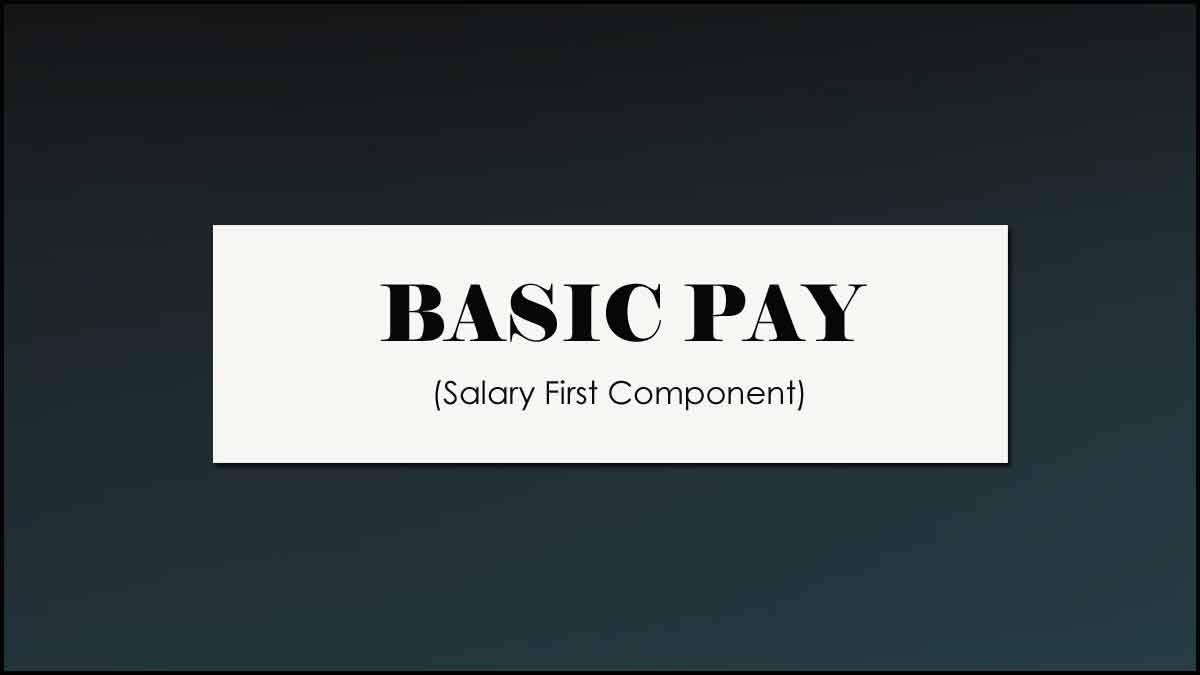The basic income of an employee or a worker, gained for the service provided is termed as Basic Salary. In general the amount of Basic Salary doesn’t include any of your appraisals, overtime pay or any kind of excess payment earned for extra hours working.
The Basic Salary is fixed amount guaranteed by employer or an organization to their respective employee or worker. Basic Salary does only change when increment given to employee on their good working or as an annual appraisal.
The Pay Slip does contain these Basic Pay as on top, which is constant in all slips and the other parts of Pay Slip does change accordingly.
What is Basic Salary
In general many do confuse the word Basic Pay, as it is the whole sum of amount which an employee receives or a constant amount which is a part of their monthly salary.

The clear answer to know what Basic Pay is for an employee, is the amount which one gets constantly every month which doesn’t include the bonus, overtime payment or any incentives. There are many points in the pay slip, which considered differently, but the Basic Pay is the one which does manage all other components to calculate all components of salary to Gross Salary.
So if you are not totally sure about what is basic salary actually is? Then learn more about what it actually holds from below..
Dearness Allowance and Basic salary
The Dearness Allowance of an employee calculated by percentage which takes base as the Basic Pay. The calculation of DA of an employee salted with reference to Basic Salary. It is quite clear that the DA should not be higher than the actual Basic Pay amount in most of the cases.
Appraisal and Basic Salary
Basic Salary does increase every year or on every appraisal cycle, which performed by employee as referred in appointment letter. The employee does have to check their eligibility criteria for appraisal, and look if Basic Pay increased as a part of appraisal.
EPF & Basic Pay
Provident Fund is a scheme which is applicable for every employee who does earn as per the eligibility criteria. The amount of Basic Pay taken as reference to the provident fund. Minimum percentage of Provident fund amount calculates on Basic Pay and deducted every month. The amount of provident fund not increased or get equal to Basic Salary amount, taken on the manual request.
Gratuity
Gratuity of an employee is their actual earnings which gained by them for working in that company. As per the Gratuity, the employee eligible to get amount if they served over 5 years in the current company. The amount of Gratuity calculated based on the Basic Pay multiplied through the formulae. Thus the employer does take the last drawn basic amount and applies it into formulae to credit gratuity amount.
High Basic Pay
There are pros and cons for having the Basic Salary amount to high. The highest Basic Pay will make you eligible for a higher share in the provident fund. Get a high gratuity amount, leaving the company and as well get the higher dearness allowance with a good amount. Higher contribution to ESIC, PF will actually utilize a good part of your earning.
On the other hand, if the Basic Pay, to be high, will attract the income tax rules. The higher Basic Pay, the chance of getting laid towards the tax also high. The employer’s tax liability will increase and the amount of tax deduction monthly over your earnings deducted High
Minimum Basic Salary
The Basic Pay being low might benefit the employee for their share in the employee provident fund, ESIC or any scheme which eligible for employee.
On the other side, the Minimum Basic Salary will get your lower share in gratuity. Also getting low credit in their pension account. The minimum wage factor also set by the Government, thus with Basic Pay being low, the companies don’t meet the norms and might not eligible for the scheme if any.
What is the difference between Basic Salary and Gross Salary?
In very simple words, the Gross salary is an overall amount which an employee does get at the end of the month. The Gross Salary does include the Basic Salary, DA, incentives or any other components organized by the company. Thus Basic Salary is one amount or a component of the salary of an employee and the Gross salary is the overall amount including the tax.
What is the difference between Hourly Pay and Basic Salary?
An employee does get the Basic Salary as it fixed amount which agreed during their employment. The hourly pay given to employee who does work on hourly basis or even to employees who work extra hours. The hourly pay calculated based on Basic Salary and added to their Pay Slip under the overtime hours earned.
How much is Basic Salary in the CTC?
An employee does get a share of 40 or 50 percent of Basic Salary in their CTC. This is a minimum requirement as per the salary structure decided by an employer. It stays similar in all companies, with changes in the Basic Salary percentage as per organization rules.
Is Basic Salary Taxable?
As per the income regulation, the Basic Salary is the very first component of an employee which is taxable. The other income sources come under the second category which does make an important effect in the taxation. It is reliable only on Basic Salary. Any component which linked with Basic Salary as DA, HRA or incentive are taxable in salary.
Can employees change their Basic Salary?
Basic Salary, a constant amount cannot change or updated by the employee or even the employer. These get changes only during the appraisal of salary. Unlike other component Provident fund, Dearness Allowance which changes as per the requirement or interest of employee.
Present pay, 47650, Date of regular, 18/10/2002, Increment, Held up, Now it clear, Present basic pay, How much.